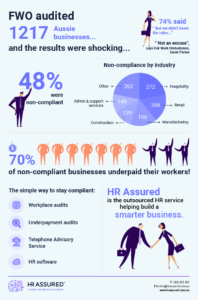If you’re a business owner or manager, you’re busy trying to navigate your business through the current recession, so we’ll keep this short.
What are ‘the basics’?
The basics of being compliant are about employing and paying your people correctly according to who they are, the way you employ them and any legislation, contracts or agreements governing them; it’s about keeping proper records and payslips, having a safe workplace and following fair and legally compliant procedures when dealing with your employees – about fulfilling your lawful obligations.
A pandemic and a recession don’t change that.
In fact, both just bring in a host of extra complications as the rules change (seemingly overnight in some cases) and business owners struggle to keep up. There are now more ways to make mistakes – the sort of mistakes that could cost you customers and ruin your reputation – and the FWO is cracking down on compliance to ensure that employers don’t let the times in which we live become an excuse for such mistakes.
But compliance doesn’t have to be difficult. So, whether you’re experiencing unprecedented demand or struggling through the slowdown, it’s not too late to take a look at how you operate and make sure you have the basics right.
Let’s take a look at how you can ensure you get the basics right, and some compelling reasons why you should…
The FWO Audit
Prior to the pandemic, the Fair Work Ombudsman (FWO) did a national audit of over 1200 businesses in a range of industries. The FWO looked specifically at what they call the ‘basics’ of workplace compliance: paying your staff correctly, giving proper payslips, and keeping adequate employment records.
The results were published in the Workplace Basics Campaign Report.
The FWO found that nearly half of the businesses audited (48%) failed to get basic compliance right. Nearly three-quarters of these were underpaying staff, while nearly a third failed to keep proper records and payslips.
The worst offenders were in Hospitality (Accommodation, Fast Food, Restaurants and Cafes), where 61% of businesses were non-compliant, and Retail, Administration and Support Services (47% non-compliance).
Nearly 300 of these businesses were forced to pay over $1.3 million to employees, and all the businesses that failed were hit with a combination of contravention letters, formal cautions, infringement notices (i.e. fines) and compliance notices.

Businesses thought they were doing things correctly
The sobering part is that almost all of these businesses thought they were compliant.
When they failed the audit, and the reasons were pointed out to them, nearly three-quarters of these employers claimed they were unaware of the applicable workplace relations obligation.
In other words: “I didn’t know what the rules were”.
While pleading ignorance of applicable laws may seem like a convenient excuse, for most businesses it’s a reality. Many employers simply don’t know what the rules are – if they did, they wouldn’t have let the problem occur in the first place!
Australia’s complicated workplace laws make 100% compliance difficult for many small and medium-sized businesses. Throw in changes resulting from a pandemic and the biggest economic recession since the Great Depression, and the task becomes even harder, especially if you’re a smaller business with no internal HR department or dedicated expert whose sole task is to know every workplace law and keep up with changes.
Large corporations – getting it wrong and getting targeted
Having dedicated internal HR people, however, still doesn’t guarantee compliance. Indeed, many of our larger clients, with entire HR departments, became our clients because their internal HR people couldn’t keep up with every Award, regulation and obligation – their business simply had too many moving parts relative to the number of experts they employed.
Our experience with many large corporations has been borne out in the slew of large corporate underpayment scandals that have surfaced in 2020 – so many that the FWO has announced that finding and penalising large companies that underpay workers (whether by accident or intent) will be a priority going forward.
If companies like Woolworths, with entire departments dedicated to payroll and HR, can still make mistakes that result in them underpaying their staff, then what hope has a small business? [Spoiler – there is hope, and not just for small businesses. Keep reading…]
Why does the Workplace Basics report matter?
To the FWO, not knowing the rules is not a valid excuse for failing in your basic obligations as an employer. As the Workplace Basics Campaign Report formally puts it: “A lack of awareness of obligations under the Fair Work Act 2009 is not a valid reason for non-compliance in the workplace.”
The report is a wakeup call to employers about how easy it is to get the basics of compliance wrong, no matter what size business. The report essentially says that you could be non-compliant right now, and not realise it, given that almost all the businesses that failed thought they were doing the right thing and assumed they were compliant.
How to ensure you have the basics right
- Look at getting an external professional to do basic compliance audit of your business (before the FWO does it for you). A good audit will uncover mistakes and vulnerabilities in the way you manage and pay your staff, check that you’re following the current laws (such as those relating to the pandemic and JobKeeper, etc.) and tell you how to fix any issues.
- Be aware of the common compliance vulnerabilities in your industry, especially if you’re in an FWO-targeted industry that has a history of non-compliance. For example, you might be in an industry that employs a lot of casuals, or staff under Awards, or shift workers, or has opening hours that cross over into weekends and evenings, leaving you vulnerable to issues with Awards and penalty rates (besides the usual payslip and record-keeping obligations).
- Stay informed. Sign up to HR newsletters (we have one), FWO alerts and media releases, and industry association publications; make the time to read these, as well as the FWO site and its free resources; make an effort to understand the information and how the regulations apply to your unique business. Pro tip: a subscription HR telephone advisory service can save you hours of time and effort here – you can just pick up the phone whenever you need to know something, get in-depth tailored advice, and not spend an eternity on hold like you would with a free service like the FWO’s.
- Prioritise your workplace compliance. Not always easy to do when you’re busy trying to run your business and look after your customers, but inescapable (and necessary) in the current environment.
- Learn your lawful obligations to your employees. If you run a small or medium-sized business and don’t have a dedicated HR manager to help you with this, think about creating an HR function through outsourcing. It’s more cost-effective than hiring an internal HR specialist, and gives you access to vastly more support and expertise than one person alone could provide, no matter how well-trained they are.
Be proactive
With the FWO continually targeting businesses of every size, and half of them failing a basic compliance audit, you need to be proactive to ensure your business isn’t one of them.
If you find managing your compliance difficult, or if you’re unsure whether you’ve got the basics right and would pass an FWO audit, there ARE cost-effective solutions available to you.
At HR Assured we offer industry-leading audits that will determine if you’re a non-compliant business, where you’re non-compliant, and then we help you fix any issues. We can also undertake cost-effective and confidential underpayment audits using our award-winning PayCheck system*. We can even take care of your compliance afterwards, with full HR support that includes HR management software and an award-winning 24/7 Telephone Advisory Service.
Get in touch with us if you’d like to find out how we can help.
*PayCheck – winner of the 2017 LexisNexis Award for Legal Innovation.




